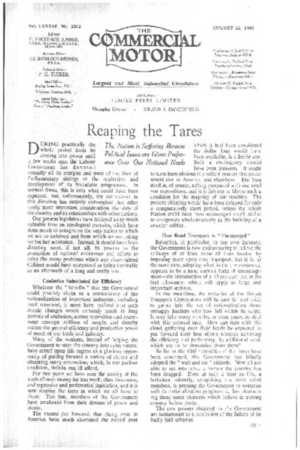Reaping the Tares
Page 23

If you've noticed an error in this article please click here to report it so we can fix it.
DURING practically the whole period from its coming into power until a few weeks ago, the Labour Government has devoted virtually all its energies and most of the time of Parliamentary sittings to the institution and development of its Socialistic programme. In normal times, this is only what could have been expected, but, unfortunately, the enthusiasm in this direction has entirely outweighed that other vastly more important consideration, the state of the country and its relationships with other nations.
Our present legislators have frittered away much valuable time on ideological pursuits, which have done much to antagonize the very nation to which we are so indebted and from which we are asking for further assistance. Instead, it should have been directing most, if not all, its powers to the promotion of national endeavour and efforts to solve the many problems which any clear-sighted Cabinet would have recognized as being inevitable as an aftermath of a long and costly war.
Confusion Substituted for Efficiency Whatever the " benefits " that the Government could possibly claim as a consequence of the nationalization of important industries, including road transport, it must have realized that such drastic changes would certainly result in long periods of confusion, arouse opposition and resentment amongst millions of people, and thereby reduce the general efficiency and productive power of much of our trade and industry.
Many of the workers, instead of helping the Government to steer the country into calm waters, have seized upon this regime as a glorious opportunity of putting forward a variety of claims and obtaining many concessions which, in our parlous condition, Britain can ill afford.
For two years we have seen the sowing of the seeds of more money for less work, class dissension, and repressive and preferential legislation, and it is now reaping the tares in which we all have to share. Too late, members of the Government have awakened from their dreams of power and plenty.
The excuse put forward, that rising costs in America have much shortened the period over which it had been considered the dollar loan would have been available, is a feeble one. Such a contingency should have been foreseen. It ought to have been obvious in a sellers' market that prices would rise in America and elsewhere. The loan itself is, of course, trifling compared with our total war expenditure, and it is fatuous to blame such a condition for the majority of our troubles. The present situation would have been delayed for only a comparatively short period, unless the whole Nation could have been encouraged much earlier to co-operate whole-heartedly in the building of a sounder edifice.
How Road Transport is " Encouraged " Reverting, in particular, to our own industry, the Government is now endeavouring to relieve the railways of at least some of their burden by imposing more upon road transport, but it is, at the same time, adopting what, in the circumstances, appears to be a most curious form of encouragement—the introduction of a 10 per cent, cut in the fuel allowance, which will apply to large and important sections.
In the meantime, the tentacles of the British Transport Commission will be cast far and wide to gather into the net of nationalization those unhappy hauliers who now fall within its scope. It may take many months, or even years, to deal with this colossal task. How can men with this cloud gathering over their heads be expected to put forward their best efforts towards achieving the efficiency and performing the additional work which are to be demanded from them?
So far as the vital necessities of the times have been concerned, this Government has blindly adopted the "wait and see" attitude. Now all are able to see into what a morass the country has • been dragged. Even at such a time as this, a turbulent minority, comprising the most rabid members, is pressing the Government to continue with its nationalization programme. thus obstruct ing those saner elements which believe in nutting country before party.
The new powers obtained by the Government are tantamount to a confession of the failure of its badly laid schemes.
















































































